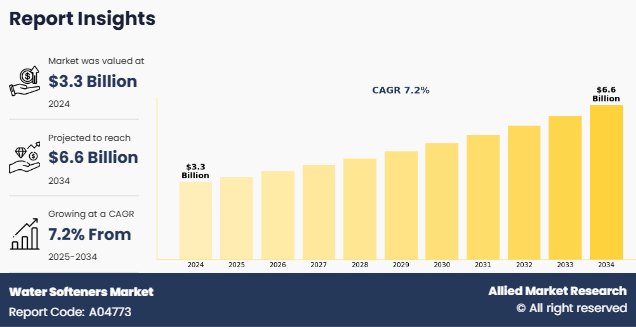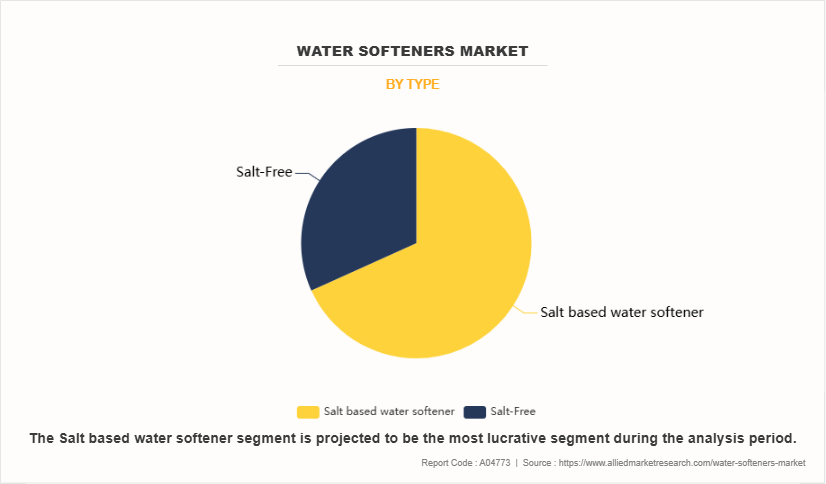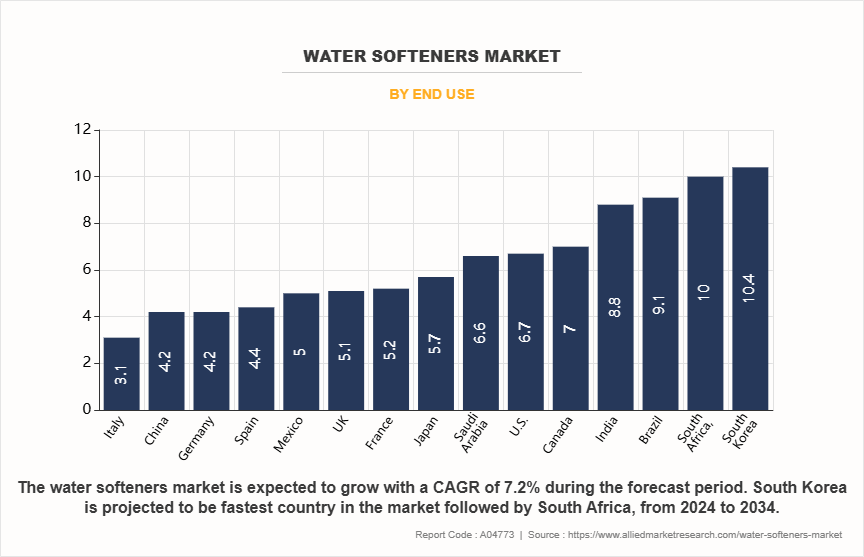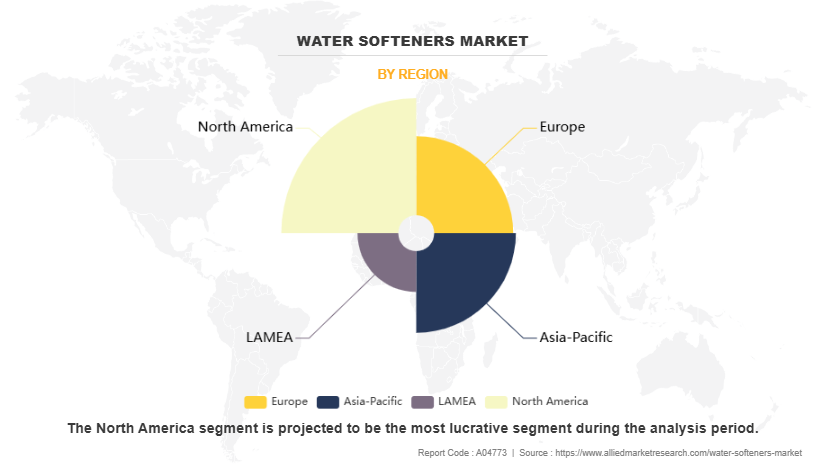Water Softeners Market Research, 2034
The global water softeners market was valued at $3.3 billion in 2024, and is projected to reach $6.6 billion by 2034, growing at a CAGR of 7.2% from 2025 to 2034. The water softeners market is poised for strong growth as rising awareness about hard water’s impact on health, appliances, and infrastructure fuels demand across residential, industrial, and municipal sectors. With increasing emphasis on water efficiency and sustainability, innovative softening technologies are becoming essential for modern water management solutions worldwide.

Introduction
Water is a vital raw material in numerous manufacturing industries such as pulp & paper, food & beverages, metal & mining, and power generation, including others. These industries utilize water for production processes such as fabrication, processing, washing, diluting, and cooling.
Key Takeaways
- Quantitative information mentioned in the North America and Europe Water Softener market includes the market numbers in terms of value ($Billion) and volume concerning different segments, annual growth rate, CAGR (2025-34), and water softerner market growth analysis.
- The analysis in the report is provided based on end-use. The study is expected to contain qualitative information such as the market dynamics (drivers, restraints, opportunities), Porter’s Five Force Analysis, key regulations across the region, and value chain analysis.
- A few companies, Culligan International Company, Kinetico UK Limited, NuvoH2O, LLC., US Water Systems, EcoWater, IEI, Hague Quality Water, Harvey‐¯Water‐¯Softeners‐¯Ltd, Pentair, and Canature hold a large proportion of the North America and Europe Water Softener Market.
- This report makes it easier for existing market players and new entrants to the Water Softeners Industry to plan their strategies and understand the dynamics of the water softeners industry, which helps them make better decisions.
Market Dynamics
Water is also used for household and drinking purposes. When water contains a significant amount of calcium and magnesium, it is called hard water. Hard water is responsible for clogging pipes and complicating soap and detergent dissolving in water. Water softening is a technique that removes the ions that cause the water to be hard, in most cases calcium and magnesium ions. Iron ions are also removed during the softening process. Increasing awareness of hard water issues is a major factor driving the global water softeners market growth. Consumers are becoming informed about the detrimental effects of hard water, including scale buildup in pipes, reduced appliance lifespan, and higher energy consumption. This has led to a surge in demand for water softeners, as individuals seek solutions to protect their homes and businesses. In addition, awareness about the health benefits of softened water, such as improved skin and hair quality, encourages more households and industries to invest in water softening systems, further boosting market growth in these regions. All these factors drive the growth of the water softeners market.
The high initial and maintenance costs associated with water softeners significantly restrain market growth. Purchasing and installing a water softener system often requires a substantial upfront investment, which can be a barrier, particularly in price-sensitive markets. In addition, ongoing costs for maintenance, including replacing filters, adding salt, and servicing, increase the total cost of ownership. These expenses discourage adoption among households and businesses with limited budgets. The perceived expense, coupled with the availability of cost effective alternatives, limits the widespread use of water softeners in various regions.
Rising awareness of hard water issues provides significant opportunities for the water softeners market. Consumers are increasingly recognizing the negative impacts of hard water, such as scaling in pipes, reduced appliance efficiency, and skin and hair problems. This awareness is driving demand for water softeners as a solution to enhance water quality and protect household infrastructure. Educational campaigns, product demonstrations, and information dissemination by manufacturers and water quality organizations further boost market growth. This growing understanding is particularly prevalent in hard water-prone regions, creating substantial potential for market expansion.
The water softeners market is segmented into type, end use, and region. Based on type, the water softeners market is segmented into salt-based water softeners and salt-free water softeners. The increase in use of salt-based water softeners in residential application drives the growth of the salt-based water softener market. Based on end use, the market is divided into residential, industrial, and municipal. The rise in the requirement of clean and safe drinking water in residential areas also boosts the growth of the water softeners market. Region-wise, the market is bifurcated into North America, Europe, Asia-Pacific, and LAMEA.

Salt-Based Water Softeners accounted for the global water softeners market share in 2024 and are expected to continue leading through 2034. Their dominance is attributed to proven efficiency in removing hardness-causing minerals such as calcium and magnesium using ion exchange processes. These systems are commonly installed in both residential and commercial settings due to their effectiveness in prolonging the lifespan of plumbing and household appliances.

The Residential segment dominated the market in 2024 and is expected to maintain its lead through 2034. Rising urbanization, increased housing development, and consumer demand for improved water quality in daily life are driving adoption. Benefits such as reduced soap usage, longer-lasting appliances, and improved skin and hair health have raised consumer awareness and demand.

North America held the largest global water softeners market size in 2024 and is projected to retain its dominance through 2034. The U.S., in particular, leads in terms of both residential and industrial installations due to high awareness of hard water impacts and favorable regulatory frameworks. The presence of established players like EcoWater Systems, US Water Systems, and Culligan International further strengthens regional market growth. Additionally, the region’s focus on smart water management and energy efficiency drives adoption of advanced softening technologies.
The key players profiled in the report include Culligan International Company, Kinetico UK Limited, NuvoH2O, LLC., US Water Systems, EcoWater, IEI, Hague Quality Water, Harvey Water Softeners Ltd, Pentair, and Canature.
Key Benefits For Stakeholders
- This report provides a quantitative analysis of the market segments, current trends, estimations, and dynamics of the water softeners market analysis from 2024 to 2034 to identify the prevailing water softeners market opportunities.
- The market research is offered along with information related to key drivers, restraints, and opportunities.
- Porter's five forces analysis highlights the potency of buyers and suppliers to enable stakeholders make profit-oriented business decisions and strengthen their supplier-buyer network.
- In-depth analysis of the water softeners market segmentation assists to determine the prevailing market opportunities.
- Major countries in each region are mapped according to their revenue contribution to the global market.
- Market player positioning facilitates benchmarking and provides a clear understanding of the present position of the market players.
- The report includes the analysis of the regional as well as global water softeners market trends, key players, market segments, application areas, and market growth strategies.
Water Softeners Market Report Highlights
| Aspects | Details |
| Market Size By 2034 | USD 6.6 billion |
| Growth Rate | CAGR of 7.2% |
| Forecast period | 2024 - 2034 |
| Report Pages | 288 |
| By Type |
|
| By End Use |
|
| By Region |
|
| Key Market Players | Pelican Water Systems, NuvoH2O, LLC., Canature Environment Products Co., Ltd., Hague Quality Water International, Inc., Harvey Water Softeners Limited, Ion Exchange Ltd., US WATER SYSTEMS INC, Culligan International Company, EcoWater Systems LLC., Kinetico UK Limited |
Analyst Review
According to the perspectives of various CXOs of leading companies, the global water softeners market is projected to experience substantial growth during the forecast period, fueled by rising demand across diverse industries including residential, commercial, and industrial sectors. The market has been expanding robustly on a global scale, driven by growing awareness of the adverse effects of hard water and the need for effective water treatment solutions.
Water softeners are increasingly sought after worldwide due to their effectiveness in preventing scale buildup, protecting plumbing infrastructure, enhancing the operational efficiency of appliances, and prolonging the lifespan of industrial equipment. The adoption of sustainable and eco-friendly water treatment technologies is becoming a key driver globally, as industries and households focus on water conservation, reducing water wastage, and improving water quality standards.
Furthermore, advancements in water softening technologies such as salt-free systems, magnetic softeners, and energy-efficient softeners are contributing to the market's evolution, offering solutions that minimize environmental impact and reduce operational and maintenance costs. These technological innovations are gaining traction in both developed and emerging economies, offering cost-effective and sustainable alternatives to traditional water softening methods.
In addition, the global emphasis on sustainability, resource conservation, and regulatory compliance related to water usage is boosting the demand for advanced water softening systems. Governments, municipalities, and private entities are increasingly adopting water softeners as part of broader water management strategies to address issues of water hardness, scale buildup, and associated costs.
As both residential and industrial sectors worldwide prioritize water conservation, operational efficiency, and improved water quality, the demand for water softeners is anticipated to continue growing across key regions including North America, Europe, Asia Pacific, Latin America, and the Middle East & Africa. This global water softerners market growth trajectory is expected to be further supported by rapid urbanization, infrastructure development, and the expanding food & beverage, healthcare, and hospitality industries, which heavily depend on water-intensive operations.
The global water softeners market was valued at $3.3 billion in 2024 and is projected to reach $6.6 billion by 2034, growing at a CAGR of 7.2% from 2025 to 2034. This strong growth is attributed to rising demand across residential, industrial, and municipal sectors, increased public awareness of water quality, and the implementation of government incentives for sustainable water treatment technologies.
The global water softeners market is witnessing a significant shift towards sustainable and salt-free technologies, particularly in regions with environmental regulations on salt discharge. Smart and energy-efficient softening systems are gaining popularity, especially in residential applications. Rising urbanization, increasing awareness of hard water-related health and appliance issues, and the integration of water softeners in smart home solutions are key trends driving future demand. Additionally, governments and municipalities are implementing incentives and standards to promote advanced water treatment technologies.
The residential segment is the leading application in the water softeners market. In 2024, it accounted for the largest share and is projected to maintain dominance through 2034. Homeowners increasingly adopt water softeners to prevent scale buildup, enhance plumbing life, improve skin and hair health, and reduce detergent usage. Urban housing growth, rising disposable income, and awareness of the adverse effects of hard water are fueling demand in this segment globally.
North America is the largest regional market for water softeners, driven by high awareness of hard water issues, strict water quality regulations, and widespread adoption in both residential and industrial sectors. The U.S., in particular, dominates the regional landscape with strong infrastructure, large-scale housing, and the presence of major players like EcoWater Systems and Culligan. Europe follows closely, especially in countries like Germany, the UK, and France, where eco-conscious consumers are adopting salt-free systems.
The key players leading the global water softeners market include: Culligan International Company Kinetico UK Limited NuvoH2O, LLC US Water Systems, Inc. EcoWater Systems LLC Ion Exchange (India) Limited Hague Quality Water International Harvey Water Softeners Ltd Pentair Canature Environment Products Co., Ltd. These companies are actively engaged in product innovation, strategic expansions, partnerships, and sustainability-driven R&D to strengthen their market position across regions.
Loading Table Of Content...
Loading Research Methodology...



